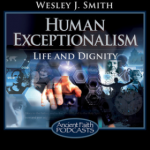
Deprecated: trim(): Passing null to parameter #1 ($string) of type string is deprecated in /home/aoiusa/public_html/wp-content/plugins/sexybookmarks/public.php on line 388
Deprecated: trim(): Passing null to parameter #1 ($string) of type string is deprecated in /home/aoiusa/public_html/wp-content/plugins/sexybookmarks/public.php on line 394
Deprecated: trim(): Passing null to parameter #1 ($string) of type string is deprecated in /home/aoiusa/public_html/wp-content/plugins/sexybookmarks/public.php on line 400
Source: Ancient Faith Radio
By Wesley J. Smith
It’s not only fetuses and babies that are viewed broadly in bioethics as “killable” and perhaps even “harvestable.” There is increasing advocacy, although it is important to emphasize that this is not yet happening, for killing those with profound cognitive impairments for their organs. I could adduce many samples of this advocacy, but space only permits one typical example, published not irrelevantly in The New England Journal of Medicine.
If you think it is respectable to consider babies, whether born or unborn, to be an inferior stage of human life, you can easily come to think that they have few rights that fully developed persons are bound to respect.
Listen here:

Transcript
 The New England Journal of Medicine recently published a scathing editorial about Planned Parenthood’s harvesting of fetal tissues. No, the editorial didn’t criticize the organization for discrediting scientific research by killing fetuses in a “less crunchy” manner, as one executive put it, to obtain intact organs. Rather, using the highly emotive language of ideological pro-abortion activism, it attacked the messenger as “radical anti-choice” for supposedly engaging in a “campaign of misinformation” for vividly revealing the cruel practices and attitudes of top Planned Parenthood abortionists.
The New England Journal of Medicine recently published a scathing editorial about Planned Parenthood’s harvesting of fetal tissues. No, the editorial didn’t criticize the organization for discrediting scientific research by killing fetuses in a “less crunchy” manner, as one executive put it, to obtain intact organs. Rather, using the highly emotive language of ideological pro-abortion activism, it attacked the messenger as “radical anti-choice” for supposedly engaging in a “campaign of misinformation” for vividly revealing the cruel practices and attitudes of top Planned Parenthood abortionists.
The New England Journal of Medicine is supposed to be an evidence-based journal, but the editorialist didn’t even try to grapple with the actual contents of the video’s release by the Center for Medical Progress, and indeed forgot to mention in their charge that the tapes “twist the truth” that the unedited originals were all released concomitantly with the edited versions, allowing for full scrutiny. Instead, the editorialists resort to the usual bromide that fetal-tissue research could lead to cures as they simply assert that Planned Parenthood follows proper ethical guidelines—all without offering any truth to rebut the contrary evidence on the tapes. They conclude:
We thank the women who made the choice to help improve the human condition through their tissue donation. We applaud the people who make this work possible and those who use these materials to advance human health. We are outraged by those who debase these women, this work, and Planned Parenthood by distorting the facts for political ends.
Technical point: The tissue in question isn’t that of the woman. It is—was—the fetus’s. Whatever one thinks of fetal-tissue research, obtaining the specimens isn’t the same as creating a cell line from an excised tumor. Moreover, utility does not justify all things. Good ethics and respect for the intrinsic value of human life are integral to a science sector supported widely by the public.
The journal’s editorialist is just one small example of how highly ideological our medical intelligentsia have become and how increasingly accepting of morally objectionable practices. To understand why this might be, why venerable medical and bioethics journals are generally supportive of controversial policy agendas such as assisted suicide and medical rationing, we have to explore the ideas that now animate the field of bioethics.
Most bioethicists, at least those without a modifier like “conservative” in front of the term, are reluctant to clearly define the boundaries that designate when human life becomes morally relevant. That leaves some of the most extreme voices in the public advocacy driver’s seat. Thus a predominant view in bioethics endorses an invidiously discriminatory approach to valuing life based on each individual’s measurable cognitive capacities.
In this view, those who are demonstrably, say, self-aware over time or able to value their own lives are deemed “persons.” Those insufficiently mature—embryos, fetuses, infants—or those who have lost those capacities, due to illnesses or injuries such as Terry Schiavo or Alzheimer’s patients, are denigrated as “non-persons.” Making matters worse, so-called human non-persons are held to have lesser worth than the rest of us.
Not only that, but under this philosophical construct, non-persons don’t have the right to life. Thus, the right to abortion is not only about protecting a woman’s right to do as she pleases with her own body; rather, abortion is also acceptable because the fetus is not deemed a person. And, indeed, for many in the field, this means that infanticide should also be allowed, and for the same reasons as abortion.
Here’s just one example. A few years ago, an article published in the Journal of Medical Ethics caused a public furor when it advocated for the propriety of what it called “after-birth abortion.” The authors inflate the scope of personal autonomy that protects what is often blandly called the “woman’s right to choose”—choose what usually goes unsaid—to a putative right not to be personally inconvenienced by an infant or the child she will later become. Thus, since an abortion can be obtained for convenience purposes and since newborns are no more persons than are fetuses, babies should also be killable, and one presumes harvestable, just as the unborn are abortable.
Here is how the authors describe their argument:
Abortion is largely accepted, even for reasons that do not have anything to do with the fetus’s health. By showing that (1) both fetuses and newborns do not have the same moral status as actual status as persons, (2) the fact that both are potential persons is morally irrelevant, and (3) adoption is not always in the best interests of actual people, the authors argue that what we call “after-birth abortion” (killing a newborn) should be permissible in all the cases where abortion is, including cases where the newborn is not disabled.
Since a baby isn’t a person, the authors opined, not only personal aims, but also well-developed plans of parents, sibling, and—get this—society “should represent the prevailing consideration in a decision about abortion and after-birth abortion.”
It’s not only fetuses and babies that are viewed broadly in bioethics as “killable” and perhaps even “harvestable.” There is increasing advocacy, although it is important to emphasize that this is not yet happening, for killing those with profound cognitive impairments for their organs. I could adduce many samples of this advocacy, but space only permits one typical example, published not irrelevantly in The New England Journal of Medicine.
Many will object to transplantation surgeons cannot legally or ethically remove vital organs from patients before death since doing so will cause their death. Whether death actually occurs as the result of ventilator withdrawal or organ procurement, the ethically relevant precondition is valid consent by the patient or surrogate. With such consent, there is no harm or wrong done in retrieving vital organs before death, provided that anesthesia is administered.
So now we can see why those who presume to possess the greatest ethical expertise in the biomedical field are not leading the charge against Planned Parenthood’s crass attitudes towards and dismemberment of fetuses to obtain salable parts.
If you think it is respectable to consider babies, whether born or unborn, to be an inferior stage of human life, you can easily come to think that they have few rights that fully developed persons are bound to respect.
If you are interested in exploring these themes from an explicitly Orthodox perspective, I highly recommend the writing of Fr. John Breck. My Twitter address is @forcedexit. I also invite you to check out the Center for Human Exceptionalism at the Discovery Institute, of which I am the co-director. We can be found at www.discovery.org, where I can also be contacted.





